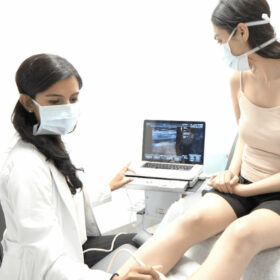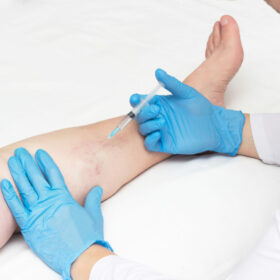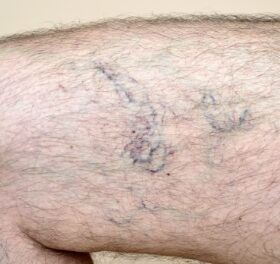Venous reflux is a condition that occurs when the valves in the leg veins fail to close properly, leading to the backward flow of blood. The resulting pooling of blood can cause a range of symptoms, from swollen legs and ankles to varicose veins and skin changes. The question many people with venous reflux ask is whether the condition can go away on its own. In this article, we’ll explore the answer to this question, along with the risk factors, symptoms, and treatment options for venous reflux.
What Are the Risk Factors for Venous Reflux?
Venous reflux is a common condition that affects millions of people worldwide. There are several risk factors that can increase your likelihood of developing venous reflux, including:
- Age: As we age, the valves in our veins can become weaker and less effective at preventing blood from flowing backward.
- Gender: Women are more likely than men to develop venous reflux.
- Genetics: If you have a family history of vein problems, you may be more susceptible to venous reflux.
- Pregnancy: The increased pressure on the veins during pregnancy can lead to the development of venous reflux.
- Obesity: Being overweight or obese can put extra pressure on the veins, increasing the risk of venous reflux.
What Are the Symptoms of Venous Reflux?
The symptoms of venous reflux can vary depending on the severity of the condition. Some people with venous reflux may not experience any symptoms at all, while others may experience:
- Swollen legs and ankles
- Varicose veins
- Skin changes, such as discoloration or thickening
- Leg cramps or aching
- Itching or burning
- Restless legs
- Open sores or ulcers
Can Venous Reflux Go Away on Its Own?
Venous reflux cannot go away on its own. Once the valves in the leg veins have been damaged, they cannot repair themselves. However, there are several treatment options that can help manage the symptoms of venous reflux and prevent the condition from getting worse. Minimally invasive spider vein and varicose vein treatments can remove the visible veins and close off the damaged saphenous vein responsible for venous reflux, thus treating the underlying problem.
What Are the Treatment Options for Venous Reflux?
At Vein Treatment Clinic, we specialize in minimally invasive procedures for the treatment of venous reflux. Our board-certified vein doctors will start by performing a thorough evaluation of your veins using vascular imaging and duplex ultrasound to diagnose the root cause of your venous reflux. From there, we’ll develop a personalized treatment plan based on your individual needs and goals.
Here are some of the treatment options we offer:
- Sclerotherapy: This minimally invasive procedure involves injecting a special solution into the diseased veins, causing them to collapse and fade away over time.
- Endovenous Laser Ablation: This procedure uses laser energy to seal off the diseased vein, diverting blood flow to healthy veins.
- Radiofrequency Ablation: Similar to endovenous laser ablation, this procedure uses radiofrequency energy to seal off the diseased vein.
- VenaSeal: This procedure involves using a medical adhesive to seal off the diseased vein, rerouting blood flow to healthy veins.
- ClariVein: This procedure uses a rotating catheter to deliver a special solution to the diseased vein, causing it to collapse and fade away over time.
- Ambulatory Phlebectomy: This minimally invasive procedure involves removing the diseased varicose veins through small incisions in the skin.
In addition to these minimally invasive procedures, there are several other treatment options for venous reflux, including compression therapy and lifestyle changes. Compression therapy involves wearing special stockings or wraps to apply pressure to the legs and improve blood flow. Lifestyle changes such as losing weight, exercising regularly, and avoiding prolonged periods of sitting or standing can also help manage the symptoms of venous reflux and prevent the condition from getting worse.
What Happens If Venous Reflux is Left Untreated?
If venous reflux is left untreated, it can lead to a condition known as chronic venous insufficiency (CVI). CVI occurs when the veins in the legs are unable to pump blood back up to the heart effectively, leading to a buildup of blood in the legs. Over time, this can cause damage to the skin and underlying tissues, leading to painful ulcers and other complications. In severe cases, venous reflux can also lead to deep vein thrombosis (DVT), a potentially life-threatening condition where a blood clot forms in one of the deep veins of the leg.
Can Venous Reflux Come Back After Treatment?
While minimally invasive procedures can effectively treat venous reflux, it’s important to note that the condition can potentially come back in the future. This is because the risk factors for venous reflux, such as age and genetics, cannot be eliminated. However, with proper treatment and lifestyle modifications, the risk of venous reflux recurring can be greatly reduced.
In some cases, scar tissue may also develop after treatment, which can cause the vein to narrow or become blocked. This can lead to a recurrence of symptoms or the development of new varicose veins. However, these issues can typically be addressed with further treatment.
How Can You Prevent Venous Reflux?
While you may not be able to completely eliminate your risk of developing venous reflux, there are several steps you can take to reduce your risk and prevent the condition from getting worse. Here are a few tips:
- Exercise regularly: Regular physical activity can help improve circulation and strengthen the veins in your legs.
- Maintain a healthy weight: Being overweight or obese can put extra pressure on the veins in your legs, increasing the risk of venous reflux.
- Wear compression stockings: Compression stockings can help improve blood flow and prevent blood from pooling in the legs.
- Avoid prolonged periods of sitting or standing: Try to move around and change positions frequently throughout the day to prevent blood from pooling in your legs.
- Elevate your legs: Elevating your legs above heart level for 15-20 minutes several times a day can help improve circulation and reduce swelling.
Visit Your Nearest Vein Treatment Clinic
Venous reflux is a common condition that can cause a range of uncomfortable symptoms, from swollen legs and varicose veins to skin changes and ulcers. While the condition cannot go away on its own, there are several minimally invasive procedures available that can effectively treat venous reflux and prevent it from getting worse.
At Vein Treatment Clinic, our board-certified vein doctors specialize in the diagnosis and treatment of venous reflux using state-of-the-art techniques and personalized treatment plans. We have multiple state-of-the-art locations across the United States, making it easy to access top-quality vein care no matter where you live. Our clinics are located in New York, New Jersey, Long Island, California, and Washington DC, with convenient hours and easy scheduling to accommodate your busy schedule. Contact us today to schedule an appointment at the location nearest you.










